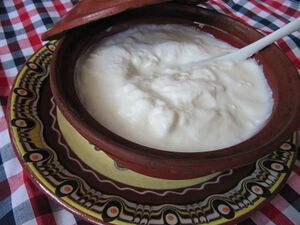Home-made Yogurt in a Sous-Vide
TL;DR - Heat 800ml (800g) full-fat (whole milk) milk to simmering - cool milk - stir in 40 ml (40g) live yogurt - cool - transfer to sterilised containers - heat at constant 113 °F / 45 °C for 4 to 12 hours - refrigerate.
The details: There's nothing very special about a yogurt maker, it just has to heat, and keep the milk at a constant temperature 45 °C / [113 °F] for 6 hours. A sous-vide has an extremely accurate temperature controller, better than most yogurt makers, I would bet.
Kilner-type jars are a good candidate for this, but just ensure they are sterilised properly first.
| Home-made Yogurt in a Sous-Vide | |
|---|---|
 |
| Servings: | Serves 10 |
| Calories per serving: | 42 |
| Ready in: | 12 hours, 30 minutes |
| Prep. time: | 30 minutes |
| Cook time: | 12 hours |
| Difficulty: | |
| Recipe author: | Chef |
| First published: | 30th March 2020 |
|
Best recipe reviewBrilliant! 5/5 This really works. Mad! |

Ingredients
Printable 🖨 shopping 🛒 list & 👩🍳 method for this recipe
- 800 ml full-fat milk (whole milk) [800g]
- 40 ml live active yogurt [40g]
Mise en place
- Sterilise your containers by washing in warm soapy water and drying in a preheated oven 160°C/gas mark 3 for 10 minutes - Soak rubbers in boiling water for a few minutes.
- Fill you sous-vide cooker with warm water and set to 113 °F / 45 °C
Method
- Heat the milk to simmering ( or at least 82 °C [180 °F] )
- Allow to cool to 45 °C [113° F]
- Add the milk to your sterilised containers and fit and close the lids
- Sit the jars in the sous-vide cooker and leave them to incubate the yogurt culture for between a minimum of 5 hours and a maximum of 12 hours.
- Remove from the sous-vide cooker and allow to cool.
- Store in the refrigerator for 12 hours to allow the yogurt to properly set.
- Use as you would normal yogurt.
Variations
Straining the yogurt and removing excess whey, makes it thicker and less acidic, less sharp and more like a Greek yogurt. The only down side is that you will lose maybe 50% during this process.
Chef's notes
Messing about with the temperatures makes slight differences in the type of yogurt created, though you may need to increase the incubation period with lower temperatures. No lower than 30° C [86° F] and no higher than 45 °C [113 °F]
Experiment!
Discover Cookipedia's Culinary Creations on Pinterest
Explore the vibrant world of Cookipedia through our Pinterest page! We've curated a stunning collection of recipes that highlight the beauty of home-cooked dishes. It's the perfect way to visually navigate our extensive recipe library and get inspired by the flavours we’ve shared over the years. Dive in and discover your next favorite meal—one picture at a time!
#yogurt #sterilised #cooker #simmering #wholemilk #fat #greekyogurt #refrigerate #dipsandsauces #sweetsanddesserts #whey